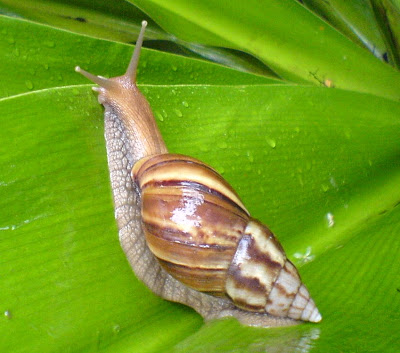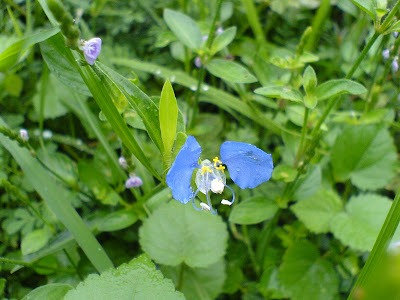17th July 2010:
Off to Nanmangalam extension centre as a Nizhal volunteer. Its been cloudy and rainy in general, but of course on 17th July its blazing hot.
The plan is to take a bunch of 60(!) high school kids around the extension centre, talk to them about trees and their importance, introduce them to native species (as against our familiar exotics like Rain Tree and Gulmohar), and hope to sensitise future citizens against indiscriminate tree cutting and to promote wise tree planting as well.
Usha takes her car, and we trundle along past Pallikaranai and Quaidemillat college, and hear blaring music from a temple loudspeaker. Its supposed to be devotional, but how anyone could feel devotional under this auditory assault is beyond me. Maybe its me that is so lacking in faith?
Anyway, if you think I am digressing I am not. Deepika said that as soon as we hear the music we were to do a U-turn and we would arrive at the extension centre gates! It was a very accurate landmark that no GPS system could have given!
Mr Ashokan the DCF turned out to be enthusiastic and committed, and so the walk was a breeze. The kids arrived with no caps and large heavy bags (should remedy this for the next school visit), but were attentive and interested.
The Extension Centre abuts the road, and there is active tree planting of indigenous species going on here. There were two views on the setting up of this centre but it seems to be here to stay.
The trees below are those planted in the extension area. Interestingly, all these native trees are high on medicinal properties. Its imperative that we research them and obtain patents.
 Terminalia arjuna - fruiting
Terminalia arjuna - fruiting Called Neer marudhu in Tamil, the Arjun tree grows all over India, and is widely used in ayurveda for a whole host of cures. The bark and leaves seem to be helful in treating heart conditions.
 Morinda citrifolia-Nuna
Morinda citrifolia-Nuna
 Morinda citrifolia-Nuna
Morinda citrifolia-NunaAnother wonder tree is nuna. The fruit you see is used to make juice that is rich in vitamins and minerals.
I stared idly at this tree. Not particularly distinguished, but it has these opposing names - Devil's tree on the one hand, and scholar's tree on the other. So our all scholars devils or are all devils scholars?!
For some reason, tribals in the Western Ghats reportedly dont like to sit under this tree as the devil is believed to live in it. Its bark is used to treat loosies, and its wood was traditionally used to make blackboards - hence the scholaris title.
 Callophyllum inophyllum - Alexandrian Laurel - punnai
Callophyllum inophyllum - Alexandrian Laurel - punnai
 Callophyllum inophyllum - Alexandrian Laurel - punnai
Callophyllum inophyllum - Alexandrian Laurel - punnaiA coastal tree, very decorative, and Usha says they are lining the streets in Pondy. I should check next time we go there. And guess what, that fruit you see is quite magical. An oil extracted from its nut is used in anti-ageing creams, and is also a viable biodiesel!!
We saw herbs that help in dandruff control, Vitex negundo (nochi) that is like a backyard mosquito control plant, sandalwood saplings, Indian rosewood and mahogany and so much more.
Next week we go back for a nature walk through the RF, with the same kids.
July 18th:
6:45 am, nagging drizzle, overcast skies. This could have been yesterday's weather, but no, I want sun I get rain, and vice versa! And why did I want sun? So the butterflies would be out, and the birds would be chirping as we took the young children of the Madras Club on a little walk around the club.
Sudhakar and Minni kindly agreed to come in as the experts, and we did stroll around the club grounds, heartened by the enthusiasm of the children. Thankfully trees stay where they are, and so we used them as the anchors for our walk!
The lovely banyan, the spreading rain trees, fish-tail palms, the massive neem on the lawns and the plentiful copper pods provided talking points.
As did this Gastropod.
Check out the muscular foot that the snail uses to move along, by its contractions. 1mm/second average snail speed.
Isn't that a beautiful glistening shell?
Sudhakar pointed out the day flowers in the green lawns underfoot. Click on the picture and see the flower zoomed in, its rather lovely, delicate and intricate, all for a day.
But this tree below was unidentified
 Tree unknown (Identified as Mimusops elengi - Magizham)
Tree unknown (Identified as Mimusops elengi - Magizham) Plumeria obtusa - Singapore frangipani
Plumeria obtusa - Singapore frangipani
 Tree unknown (Identified as Mimusops elengi - Magizham)
Tree unknown (Identified as Mimusops elengi - Magizham) Plumeria obtusa - Singapore frangipani
Plumeria obtusa - Singapore frangipani
The flowers of this plumeria are different from the common one, rather more elegant I thought.
And so we wound up, after more earthworms, cotton stainer bugs, seven spotted cockroaches, millipedes, centipedes and a red bead tree.
We were rewarded by a sumptuous breakfast that included "mla pesarattu" - also a first time for me!!

 The huge snail that caught all the oohs and aahs
The huge snail that caught all the oohs and aahs Commelina - day flowers
Commelina - day flowers


 Pulicat Lake - a crowd of egrets with a couple of painted storks
Pulicat Lake - a crowd of egrets with a couple of painted storks
 The yellow feet of the little egret
The yellow feet of the little egret Cattle egret in breeding plumage. Photo by Mr Ramanan
Cattle egret in breeding plumage. Photo by Mr Ramanan Great egret - Casmorodius albus - tallest of the white egrets. Long neck, and bluish green lores. Those feathers on the back are additional breeding plumage. Photo by Mr Ramanan
Great egret - Casmorodius albus - tallest of the white egrets. Long neck, and bluish green lores. Those feathers on the back are additional breeding plumage. Photo by Mr Ramanan Intermediate egret - Mesophoyx intermedia - smaller than the large. Yellowish lores during breeding. What you see is additional breeding plumage. Photo by Mr Ramanan
Intermediate egret - Mesophoyx intermedia - smaller than the large. Yellowish lores during breeding. What you see is additional breeding plumage. Photo by Mr Ramanan Little egret - Egretta garzetta - small and graceful. What a pose! Photo by Mr Ramanan
Little egret - Egretta garzetta - small and graceful. What a pose! Photo by Mr Ramanan Photo by Mr Ramanan
Photo by Mr Ramanan

 The dome of St Isaac's. 100kgs of gold leaf were required to gild it. Opened in 1858
The dome of St Isaac's. 100kgs of gold leaf were required to gild it. Opened in 1858 Malachite Room at the Winter palace - 1839, showing the gilded doors as well
Malachite Room at the Winter palace - 1839, showing the gilded doors as well Malachite Room, again. This was the room where the Provisional Government based themselves, in the interim between the fall of the tsar and the takeover by the Bolsheviks
Malachite Room, again. This was the room where the Provisional Government based themselves, in the interim between the fall of the tsar and the takeover by the Bolsheviks The gilded iconostasis within the P&P cathedral
The gilded iconostasis within the P&P cathedral More gold, decorating the top of a wooden cabinet at the Winter Palace
More gold, decorating the top of a wooden cabinet at the Winter Palace Gilded statues at Peterhof's Grand Cascade
Gilded statues at Peterhof's Grand Cascade Great Indian Bustard - Photo by Mr Ramanan
Great Indian Bustard - Photo by Mr Ramanan Russian coat of arms that dates back to the 15th century
Russian coat of arms that dates back to the 15th century


 Palace Square!
Palace Square! The General Staff Building
The General Staff Building The Winter palace
The Winter palace The Gold Drawing Room at the Winter Palace
The Gold Drawing Room at the Winter Palace Raphael Loggias - a complete copy of Raphaels' frescoes at the Vatican adornone of the Winter palace's corridors
Raphael Loggias - a complete copy of Raphaels' frescoes at the Vatican adornone of the Winter palace's corridors St Isaac's Cathedral - one of the world's largest. Served as the Museum of Atheism during the Soviet era. Is still a museum, of art though.
St Isaac's Cathedral - one of the world's largest. Served as the Museum of Atheism during the Soviet era. Is still a museum, of art though. Peter's compact Summer Palace
Peter's compact Summer Palace The Peter & Paul Fortress, on the other side of the Neva
The Peter & Paul Fortress, on the other side of the Neva Church of Spilled Blood
Church of Spilled Blood Ceiling to floor mosaics!
Ceiling to floor mosaics!
 St Nicholas' Cathedral
St Nicholas' Cathedral The Mariinsky theatre, home to the Kirov ballet
The Mariinsky theatre, home to the Kirov ballet
 Olesya Novikova & Leonid Sarafanov take a bow.
Olesya Novikova & Leonid Sarafanov take a bow. Literary Cafe - from where Pushkin set off for his fatal duel with Baron d'Anthes (who seduced his wife), on 27th Jan 1837.
Literary Cafe - from where Pushkin set off for his fatal duel with Baron d'Anthes (who seduced his wife), on 27th Jan 1837. The palace at Peterhof, with the magnificent and golden fountain in the foreground
The palace at Peterhof, with the magnificent and golden fountain in the foreground View from above the Grand Cascade, loking down towards the Gulf of Finland
View from above the Grand Cascade, loking down towards the Gulf of Finland The Victory Monument, erected in 1975, in memory of the city's 900 day siege during the second World War. The city did not surrender, but millions died
The Victory Monument, erected in 1975, in memory of the city's 900 day siege during the second World War. The city did not surrender, but millions died The lone surviving statue of Lenin, in St petersburg that was Leningrad. In fron the of the Communist party office.
The lone surviving statue of Lenin, in St petersburg that was Leningrad. In fron the of the Communist party office. Last views from the air...
Last views from the air... A male koel calls. Photo by Mr Ramanan
A male koel calls. Photo by Mr Ramanan The female koel arrives. Photo by Mr Ramanan
The female koel arrives. Photo by Mr Ramanan The koel male has blue-green feathers, adding to its basically black plumage. Photo by Mr Ramanan
The koel male has blue-green feathers, adding to its basically black plumage. Photo by Mr Ramanan

